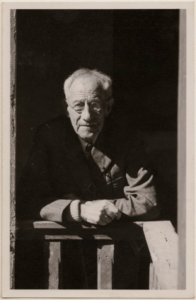 The Practice of Art History in Britain, 1900–1960 (London, 30 Nov-1 Dec 23)
The Practice of Art History in Britain, 1900–1960 (London, 30 Nov-1 Dec 23)
Paul Mellon Centre, London, Nov 30–Dec 1, 2023
Deadline: May 21, 2023
In 2017, the Paul Mellon Centre acquired the archive and library of Paul Oppé (1887–1957). The archive is one of the most comprehensive collections of the private and professional papers of an art historian in twentieth-century Britain. Oppé is best known as an independent scholar and a leading expert on British works on paper. A trained classicist, Oppé also acted as advisor and buyer for international museums, he wrote literary criticism, published popular art books, occasionally worked for museums (e.g. as Deputy Director of the V&A) and was a notable collector of eighteenth-century prints and drawings.
The conference takes Oppé’s life and multifaceted career as a springboard to reassess British art historiography in the first half of the twentieth century.
The conference asks:
– In the early twentieth century, when the subject was not yet established in higher education, how did private scholars carve out a career in their chosen field?
– What were the societal, financial and intellectual pressures that shaped their itineraries and academic priorities?
– How was academic research enabled by an emerging semi-professional infrastructure, for example clubs and institutions such as the Walpole Society, the Burlington Fine Arts Club or the Royal Collection?
– How did scholars navigate between different spheres of the artworld, e.g. museums, the art market, academic publishing and art criticism? Are these best considered as separate professional realms, or can we identify synergies between them?
– What relationships were emerging between British art history and the global art histories that were in formation over the same decades?
– Lastly, are there continuities in art-historical practice between the pre- and post-war periods, i.e. on either side of a period of change that saw the arrival of the Courtauld and Warburg Institutes, and a rapid professionalisation of art history?
The conference seeks to question the frequent assumption of British art history as a fractured pursuit with limited professional ambition. We hope to showcase new research on a range of actors and institutions that have not yet received much historiographic attention. While focusing primarily on the tacit protocols and practices that informed the dominant forms of scholarly work, we hope that this also allows for new ways to think about “big names” such as Kenneth Clark or the Courtauld Institute, and how they relate to the activities of their lesser-known peers.
We invite contributions from scholars interested in a wide range of subfields and cognate disciplines. These include, but are not limited to, art historiography, histories of collecting, museums, exhibitions, periodicals, libraries and archives, and publishing.
To propose a paper, please email an abstract of 300 words or fewer and a 50-word biography in a single Word document by 11.59pm (BST) on Sunday 21 May 2023 listing “Oppe proposal” as the subject line to events@paul-mellon-centre.ac.uk
While we are keen to hear from scholars with an interest in Oppé’s life and career, we are equally open to contributions on other connected topics. Participants will be provided with a reader including materials from the Oppé archive, serving as a documentary basis for our discussions.
Successful contributors selected through this open call will be paid a fee of £150 for their participation and a contribution will be made towards travel and accommodation costs. You may also be asked to participate remotely. If there is any relevant information that you would like to share with us, such as required adjustments or access needs, please do let us know when you submit, and we will do our best to support these.

Leave a Reply
You must be logged in to post a comment.